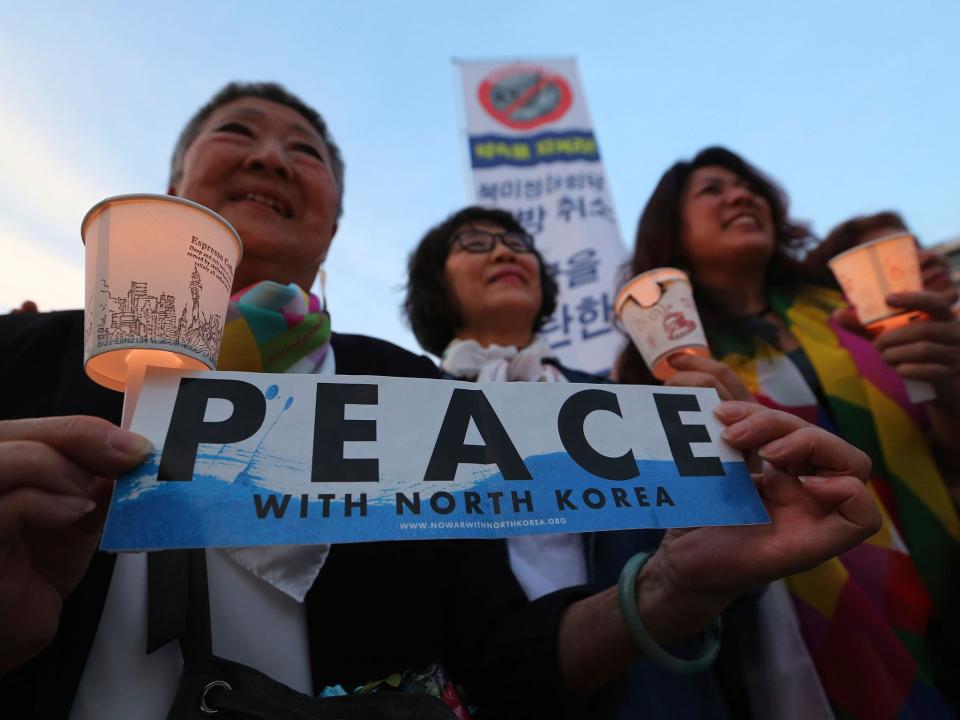US-North Korea summit: Amid shock and confusion, sense in Seoul the Trump-Kim meeting can be saved

Politicians and civilians alike have been left reeling in South Korea after US President Donald Trump’s seemingly spontaneous decision to call off firm plans to meet North Korea’s leader Kim Jong-un in Singapore on 12 June.
South Korea’s President Moon Jae-in responded Friday with apparent shock and a sense of betrayal, his aggrieved feelings obvious in his remark that he was “very perplexed” and it was “very regrettable” that the summit would not be held as scheduled.
In an emergency session with top aides, Mr Moon left no doubt his shock was all the more acute since he had met Mr Trump just two days earlier in the White House for what was supposed to be an opportunity in person to coordinate on how to deal with Mr Kim.
Instead, with the summit not about to happen, Mr Moon encouraged Mr Trump to get in touch with Mr Kim as soon as possible, perhaps by phone.
There was, said an aide, an urgent need for direct communication in order to resolve what South Korea’s leadership regarded as misunderstandings.
The American president and the North Korean dictator needed “to communicate in a direct way to grasp what the other party has in mind.” The aide described Mr Trump’s decision as “a snag”, one that Mr Moon’s government clearly hopes can be overcome.
Interestingly, that view was quite similar to the response from North Korea, whose influential first vice foreign minister, Kim Kye-gwan spoke highly of Mr Trump and his earlier decision to engage in summitry after having threatened to go to war against North Korea last year.
In a lengthy statement carried by Pyongyang’s Korean Central News Agency, Kim Kye-kwan offered this flattering assessment: “We have inwardly highly appreciated President Trump for having made the bold decision, which any other US presidents dared not, and made efforts for such a crucial event as the summit.”
Those soft words came as a surprise to South Korean and American officials alike. They had fully expected a blast of invective from North Korea and particularly the vice foreign ministry, who the week before had lambasted the US for insisting on complete denuclearisation, making clear the North had no intention of giving up its nuclear programme on which leader Kim Jong-un has staked his prestige.
On Friday, however, North Korea appeared to be changing its tune in an effort to persuade Mr Trump to change his mind.
Kim Kye-gwan even seemed inclined to back away from his refusal of the previous week to consider denuclearization.
Rather, he said, “We even inwardly hoped that what is called "Trump formula" would help clear both sides of their worries and comply with the requirements of our side and would be a wise way of substantial effect for settling the issue.”
While both South and North Korean leaders sought to recover from Mr Trump’s decision, sentiment on the streets of Seoul ranged from surprise and disappointment to relief and applause.
“It is very disappointing for the Americans to behave this way,” said Jang Sung-eun, a manager for a small company. “They should try to resolve the problem. They are making it worse.”
But that view was by no means universal. Conservatives applauded Mr Trump, some of them carrying signs and American and South Korean flags, saying President Moon should “resign” or at least give up his overtures toward the North.
They were opposed by demonstrators attempting to get near the American embassy, carrying signs urging US forces to “go home.”
Amid such conflicting views, however, the overwhelming sense was that somehow it might be possible eventually to get the Trump-Kim summit back on track.
At the same time, Secretary of State Mike Pompeo sought to assuage damaged feelings and sensitivities here in a phone conversation with the foreign minister, Kang Ktyung-wha. The foreign ministry said that he had told her the US had “a clear will” for continued dialogue.
The most surprising assurance from the US side came from the commander of America’s 28,500 troops in Korea, General Vincent Brooks. At a forum here, he said he was “not worried” about cancellation of the summit “because the opportunity is not lost, just delayed.”
While it “may have been too early to celebrate” the summit, he said, it was “also too early to quit – never quit.”

 Yahoo News
Yahoo News 